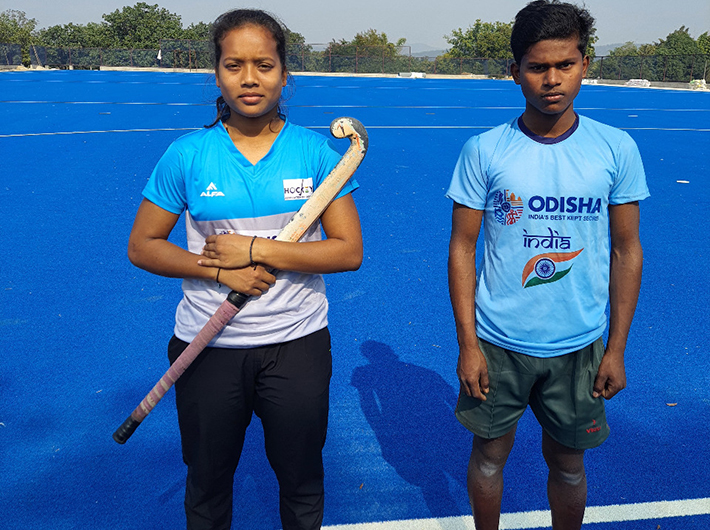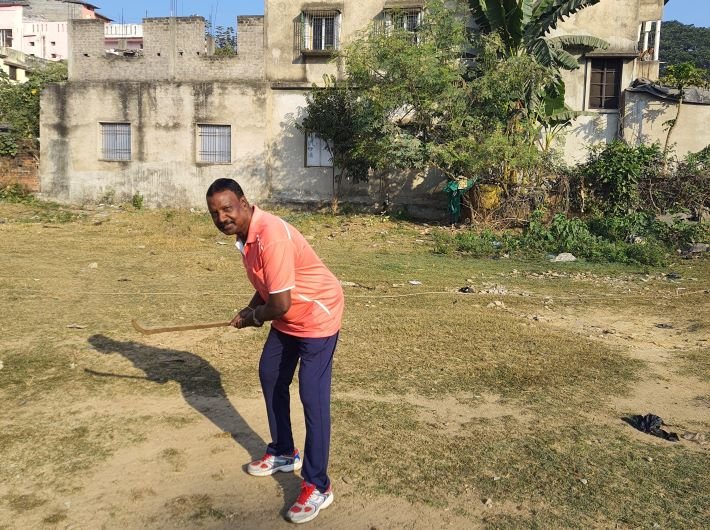For people in this tribal-dominated district of Odisha the sport is a way of life – and could also assure livelihood
Neha Lakra, 20, doesn’t forget to practise hockey, at least for four hours, every day. Whether at home or at the Panposh sports hostel in Rourkela where she is training under the guidance of coaches, her routine doesn’t change. “I can’t sleep unless I have worked on the ground,” says Neha, who expects to make it to the India camp. With her eyes grazing around the newly laid astroturf on her village ground, she adds, “I just love the game, can’t think of a life without hockey.”
Neha is not alone. For many in her village, Saunamara, and also in the Sundargarh district of Odisha, hockey is a part of their everyday life. They worship the sport, which is a religion in the tribal-dominated district.
Sundargarh, the cradle of hockey, has produced over a hundred internationals (senior and junior of both the genders). Many of them are considered among the legends of the game.
Neha’s village, Saunamara in Balisankara block, alone is home to five of them. Hockey India president and ex-Olympian Dilip Tirkey, Amit Rohidas-the current vice captain and an important member of the India side that won Bronze medal at the Tokyo Olympics 2022, ex-India (women’s) captain, Subhadra Pradhan, and Dipsan Tirkey had learnt playing the game on the village ground. Dilip represented the India side in three Olympics.
Like Saunamara, there are many villages from where more than one player has represented the country. Twenty kilometres away, an obscure Lulkidihi, bordering Chhattisgarh, boasts of three international players including Deep Grace Ekka, the vice captain of the Indian women’s team. Grace has played in two Olympics. Before her, two others from her village, the Tirkey Brothers (Prabodh and Ignace), had played for the country.

Neha Lakra with a fellow player at the training ground
Along with Amit Rohidas, Nilam Sanjeep Xess from this district were part of the India team playing in the ongoing FIH Men’s Hockey World cup 2023, being hosted by Odisha. The coastal state is hosting the Cup for the second successive time – the last time was in 2018 when Belgium was the champion. Odisha is the official sponsor of both the Men’s and Women’s national hockey teams till 2033.
The Naveen Patnaik government has taken up a number of steps towards promotion of hockey infrastructure. Besides in other districts, astroturfs are being laid in all 17 blocks of Sundargarh. One of the two venues of the World Cup, the state-of-art Birsa Munda stadium, named after the tribal freedom fighter, stands tall in Rourkela. The other venue is the Kalinga stadium in Bhubaneswar which hosted all the matches of the 2018 edition of the event.
However, much before such sponsorships and world-class infrastructure, the sport had arrived in Sundargarh. And it had become a part of the local culture.
It’s said that hockey was brought to Sundargarh by British soldiers in the ninetieth century. However, the missionaries spread it around and made it popular. According to the first hockey coach of Odisha, Sylvester Toppo, every Sunday the missionaries played matches among themselves. It caught the attention of the locals, and they fell in love with it.
In the absence of any means of entertainment, hockey occupied the entire space. The socio-economic condition of the district was equally conducive for its spread. “Hockey is a poor man’s favourite game, it suits us the most,” says Salmon Minz, 83, of Nimdihi village. “The poor locals couldn’t afford to play cricket or any other expensive sport,” he adds.
Minz and others of his age, practised with sticks made of bamboo, some made sticks using branches of the Kendu tree. They used locally available fruits similar to custard apple as ball. They also heated a mix of polythene and charcoal and, using their hands, gave it the shape of a ball.
In due course, local tournaments involving different villages became a much-sought-after affair. Even today, tournaments where the winning team takes home a garlanded goat (“khasi”) are a top draw. With that goat, the winners throw a celebratory feast for the entire village.
Decades ago, different villages held tournaments with a ‘desi kukuda’ (local chicken) as trophy. For some years, tournaments with pigs as prize had made into the tribal villages. However, the Khasi cup tournaments have stayed on since the 1980s. Some villages too host junior-level tournaments (under-14) the winners of which receive a sweeter prize: chocolates.
With each village represented as teams, matches in these tournaments are intensely fought. For the players, the pride of the village is far more important than the prize.
Incidentally, all international players have, for some years in their early career, played in the local tournaments. “These tournaments make you a local hero instantly,” says ex-India player Lazarus Barla, who still remembers the fun associated with these events.
According to Minz, when a team won a local tournament, the players received a rousing reception from their villagers. With garlands around their neck, the team members were taken around in a big procession with song and traditional dance performances by all residents. “Not only in our village, but the organizers too indulged us with good food,” recalls the octogenarian.
Toppo who has groomed scores of talents, of which at least twenty, including Lazarus Barla, Namita Toppo and Lilima Minz went on to represent India, has carefully preserved his childhood hockey stick- made of bamboo, as well as those memories.
Many like Toppo and former district sports officer Abhay Patnaik believe that the 1980s heralded a new era for hockey in Sundargarh. In Peter Tirkey the district produced its first international player in 1982. Peter played in the second FIH Junior World Cup in Kuala Lumpur.
During the decade, in order to groom and promote local sporting talents the Janaki Ballabh Patnaik-led Congress government had set up sports hostels in different districts including the one at Panposh. Athletes picked during scouting camps were groomed under professional coaches, and subsequently the astroturf facility was availed at the Panposh hostel. From this hostel over 60 players have gone on to play for India.
Explaining why Sundargarh produces so many hockey stars, a senior woman coach says that the tribals are natural athletes and they are hardworking as well as highly devoted to the sport.
“Their level of immunity and endurance is high. They hardly fall sick or complain of any illness,” reasoned the coach, adding, “A cut, wound or swelling in their legs or hands don’t bother the tribal athletes. In case of a cut or swelling in hand or leg, they would squeeze some herbs, apply that on it and rush back into the ground. None would ever complain of tiredness even after four-five hours of intense practice. In my over three decades career I haven’t heard one say no to practice – ever.”
For the athletes, hockey is the passport to an assured future. Around 1,200-1,400 hockey players from the district have been got employment in state government, different departments of the central government, PSUs as well as private companies.
“Spend a few days in any village and you will realise what hockey means to the people here in Sundargarh. It’s their only obsession,” says Toppo with a smile.
